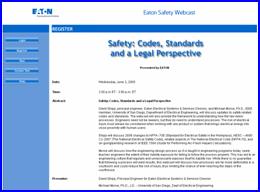Safety: Codes, Standards and a Legal Perspective
Webcast
Date: June 3, 2009
Time: 2 p.m. ET
Eaton Corporation is sponsoring a webcast on Safety: Codes, Standards and a Legal Perspective. David Shipp, principal engineer, Eaton Electrical Systems & Services Division, and Michael Morse, Ph.D., IEEE member, University of San Diego, Department of Electrical Engineering, will discuss updates to safety related codes and standards. The webcast will provide the framework to understanding how the law views processes. Engineers need not be lawyers, but they do need to understand processes. The risk of electrical injury must always be considered when working with any product or system that brings electrical energy into close proximity with human users.
To register to view this free live webcast, go to their site at http://video.webcasts.com/events/pmny001/viewer/index.jsp?eventid=30480 and click on Register.
David Shipp is a Professional Engineer in Pennsylvania and Oregon, and a Principal Engineer for Eaton Electrical Systems & Services Division. He is a recognized expert in power system analysis and has worked in a wide variety of industries. Shipp will discuss 2009 changes to NFPA -70E (Standard for Electrical Safety in the Workplace), NESC – ANSI C2-2007 (The National Electrical Safety Code), related aspects in The National Electrical Code (NFPA-70), and on-going/pending research of IEEE 1584 (Guide for Performing Arc-Flash Hazard Calculations).
Michael Morse, Ph.D., is an IEEE member, University of San Diego, Department of Electrical Engineering. He has spent much of the last two decades of his professional career studying the effects and outcomes of electrical contact on the human body and consulting as a forensic expert in electrical injury and electrical product failure cases. As both an engineer and a lawyer, Dr. Morse has focused his efforts on cases involving failure of engineering technology at the interface between humans and human-made technology. Morse will discuss how the engineering design process as it is taught in engineering programs today, rarely teaches engineers the extent of their liability exposure for failing to follow the process properly. This has led to an engineering culture that regularly and unnecessarily exposes itself to liability risk. While there is no guarantee that following a process will yield results, this webcast will discuss how processes are far more defensible in a courtroom and could reduce the risk of injury, thus limiting the chance of ever reaching the steps of the courthouse.
To register, click here and for more information on the presenters click on the Bios tab on the left.